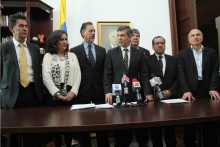Colombia: recognition of public service workers’ rights

The introduction of the bills was also attended by the ILO’s representative in the Andean countries, Carmen Moreno, and representatives of the trade union centrals, public service union federations and PSI, who all asked Congress to approve the three bills quickly so as to facilitate rapid implementation of their principles and provisions.
The National Agreement, reached after negotiations on the National Unified List of Demands, contains 28 points, including the incorporation of ILO Conventions 135, 149 and 183 and changes to Decree 1092, issued in 2012 to regulate collective bargaining in the public sector. In February 2014, the government issued Decree 160 on collective bargaining in the public sector. Trade unions believe this was a step forward in the process of consolidating the employment rights of public sector employees in Colombia. However, it did not fully meet trade union expectations. Representatives of public sector workers have also asked the government to comply fully with all the points in the National Agreement. Still pending are a decree on job classifications in the public administration and compliance with constitutional court rulings (C-614/05 and C-171/12) requiring an end to unconstitutional parallel, outsourced and informal employment of workers and the consequent promotion and expansion of formal employment, among other points.
The progress made in collective bargaining for public sector workers in Columbia has been based on a decisive premise: unity of action by all trade unions representing public sector workers. They have placed the common interest of workers above their differences and have succeeded in maintaining a sustained level of trade union discussion and action. Union leaders say their attempts to achieve full collective bargaining rights for public sector workers still need to overcome obstacles imposed by the authorities at different levels of the public administration, essentially at local authority level, and which reflect the anti-trade union culture that has prevailed for so long in the country. In an assessment of the state of play of negotiations, union leaders said continued unity of the workers will allow them to meet the challenges they face.

